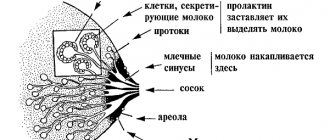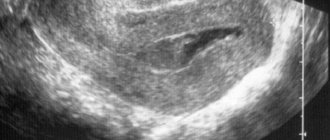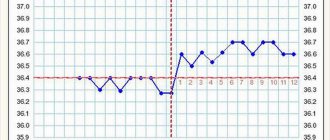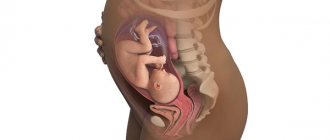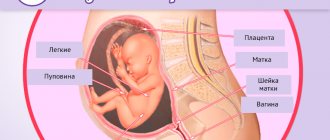What happens to the body in the 9th month of pregnancy
The last month of pregnancy has arrived, it lasts from the 37th to the 42nd week of pregnancy, on average children are born at 38-40 weeks, and only some a little earlier or later. After 38 weeks of pregnancy, the fetus is considered full term, and delivery can begin on any day, only about 5% of children are born exactly on the expected date.
At this stage, the woman is already quite tired of her position and her stomach, which has become very heavy; the agonizing wait and frequent training contractions make her tired and irritable. Now you can no longer be afraid of premature birth if you previously had problems with pregnancy or had complications. Often, with a planned caesarean section, delivery is planned for a period of 38-40 weeks, so that the fetus is as mature and full-term as possible. The last weeks are especially difficult for those who will give birth for the first time, since the sensations of real contractions are still unfamiliar and you are often ready to go to the maternity hospital with training ones.
The body is actively preparing for the process and so-called precursors constantly appear. Two to three weeks before delivery, the abdomen lowers due to the insertion of the fetal head into the pelvic cavity and gradual relaxation of the lower segment of the uterus and cervix. With repeated pregnancies, the stomach may drop immediately before childbirth or at its beginning. The abdominal circumference may decrease slightly due to relative oligohydramnios, due to changes in hormonal levels, which helps in delivery and reduces the risk of complications (umbilical cord prolapse, malpresentation, placental abruption). It will become easier for a woman to breathe, heartburn and discomfort when eating will decrease.
Pain in the lower back and pelvis may be bothersome; the joints and ligaments soften, which helps during childbirth, but affects the condition of the back and pelvic area. Particularly unpleasant and severe pain can be when lowering the head into the pelvis, pressure in the pubic area, sacrum at night, pain in the perineum and vaginal area, it is difficult to find a position in bed and sleep peacefully. Training contractions can become more frequent and stronger, they help the uterus to actively contract in the future. Training contractions are irregular and go away if you calm down and rest on your side, they have the appearance of pulling in the lower abdomen and a feeling that the stomach is turning to stone.
Before giving birth, special body changes called labor signs may occur, along with a drooping belly. Such signs include a decrease in body weight within 2 kg due to the convergence of edema and hormonal changes in the body, decreased appetite and physiological cleansing of the body. Shortly before the event, appetite decreases or disappears completely, there may be loose stools and even diarrhea, nausea and vomiting.
Within a few days or even weeks, the mucous plug may begin to come off - it can come off in parts or entirely, in a lump, as the cervix ripens and the cervical canal opens. The mucus may be yellowish in color, colorless, or streaked with blood. You need to completely pack your bags and documents and be ready to go to the maternity hospital at any time from the start or breaking of your waters, or regular contractions at regular intervals. In the ninth month of pregnancy, a woman must always take an exchange card with her when leaving home.
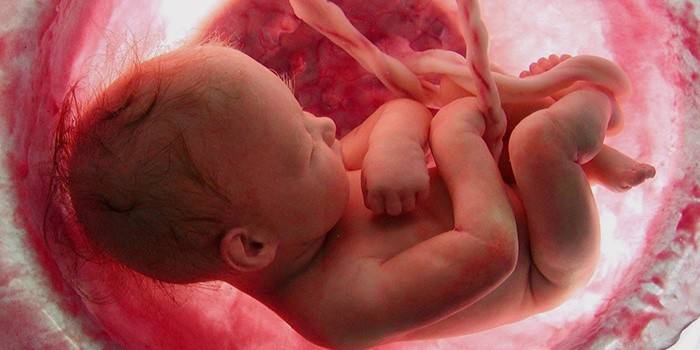
Hard belly during pregnancy
A hard belly during pregnancy may be one of the symptoms of uterine hypertonicity. Unfortunately, uterine hypertonicity is considered a pregnancy pathology, but there is no need to panic in advance. Firstly, there are much more women who have been diagnosed with this than women giving birth without any pathologies. And secondly, this disease is treatable and if you follow all the recommendations, everything will work out. The main thing is to see a doctor in time and start treatment.
Most often, uterine hypertonicity occurs in the second and third trimesters of pregnancy. It is determined by heaviness in the lower abdomen; there are frequent cases of pain that some women experience during menstruation. These symptoms may be accompanied by pain in the sacrum in the lumbar region, unpleasant sensations such as bloating in the lower abdomen, severe pain in the center of the abdomen. However, if this is the first time you have felt such symptoms, we advise you to simply lie down and rest; perhaps this is a consequence of stress, and not a manifestation of the disease. If the pain recurs, consult a doctor to relieve the pain and determine the presence of pathology.
The symptom of a hard abdomen during pregnancy requires careful diagnosis, as it may pose a threat of miscarriage. The fact is that with hypertonicity, the uterus begins to contract before a certain date of birth, which is incorrect and poses a threat of spontaneous abortion. With hypertonicity, blood circulation in the placenta is impaired, which leads to insufficient oxygen supply to the fetus. In addition, hypertonicity can provoke retarded fetal growth and development both before and after childbirth.
More on the topic
Stitching pain in the lower abdomen during pregnancy
Pain in the lower abdomen during pregnancy
Pain in the lower abdomen in early pregnancy
Hypertonicity of the posterior wall of the uterus during pregnancy
Contraction of the uterus during pregnancy
The reasons for the increased tone of the uterus, as well as a hard abdomen, are endocrine and hormonal disorders, infectious and inflammatory processes in the woman’s genital organs, underdevelopment of the uterus, a malfunction in the immune system, stress, and depression. In the later stages, hypertonicity can develop against the background of polyhydramnios or due to the fetus being too large inside the womb. Heavy physical activity and injuries during pregnancy also lead to increased tone of the uterus during pregnancy.
If you feel heaviness and nagging pain in the lower abdomen, try to relax as much as possible, turn on calm music and lie down to rest. After relief, be sure to visit your doctor and tell him about the nature of the pain. If the stomach becomes hard and the pain increases and becomes very severe, then be sure to call an ambulance, and you need to wait for the doctor only in a horizontal position.
Of course, there is nothing good about uterine hypertonicity, but there is no need to get upset in advance. Often, after examination and treatment, the pain disappears without returning. Otherwise, you will be offered inpatient treatment in the pregnancy pathology department in order to preserve the fetus and normalize the course of pregnancy. Many women neglect hospital treatment, but in vain. It is in the hospital that qualified specialists try to provide you with complete peace of mind and monitor your condition and the condition of your child around the clock. In addition, sedatives and antispasmodics are prescribed, and in some cases, hormonal medications are often prescribed that will regulate hormonal levels, and therefore help pregnancy proceed as normal.
But, as we know, the easiest way is to prevent such diseases, but to engage in prevention and try to minimize the risk of uterine hypertonicity. Experts recommend starting prevention before pregnancy, that is, during planning. To do this, future parents should be examined for infectious diseases, minimize alcohol consumption, and try to quit smoking. If you are actively involved in sports, then during the planning period you should reduce physical activity. As for your mental state, it would be advisable to attend a yoga class or simply learn a few techniques that will help you relax.
Take care of your health, take care of your unborn child and be healthy.
Especially for beremennost.net – Ira Romaniy
Fetal development: weight, size and gender
At this time, the baby is already fully formed and ready for birth and life outside the mother’s tummy. The child has the entire necessary set of reflexes; the lungs perform breathing movements, although they are still collapsed and will open only with the first breath. They produce enough surfactant to breathe on their own. The digestive system has matured and is ready to accept food and digest it with enzymes; a lot of original feces have accumulated in the intestines, which should be removed only after the birth of the child. It was formed from amniotic fluid, epithelial cells, desquamated cells that enter with swallowed water. Meconium has the appearance of a putty-like olive-green mass, odorless.
By the ninth month, the baby has a proportional body, the skin is smooth and has a pale pink color, the skin vessels are no longer translucent, the fluff (lanugo) has almost disappeared from the body, remaining only a little on the shoulders and back, in the area of natural folds, along with the original lubricant, which protects the baby's delicate skin. Now the baby is actively gaining weight and growing in height, it is becoming more and more crowded in the uterine cavity, he is taking the uterine and most optimal position for childbirth - head down, pressing his arms and legs tightly to the body. He does not have the opportunity for active movements, and now it is mainly pushing, tossing and pulling. They are clearly felt by the mother.
The nervous system matures, it becomes more and more perfect, developed and mature. The nervous system regulates the functioning of all internal organs and glands, which allows the body to function as a single system.
This month, the fetal liver actively accumulates iron for further use for the child’s needs in the first months after birth. Iron is essential for creating new blood cells and preventing anemia. The heart has fully formed chambers and valves, with the exception of those openings that are needed for fetal blood flow, so at birth it will be ready to work in a new way, and the fetal openings will immediately close. Now the oval window and the ductus ductus are open, so that the blood bypasses the lungs, and the baby “breathes” the placenta. At the same time, the lungs themselves, due to the penetration of amniotic fluid into them, perform “breathing” movements and develop.
In boys, the testicles finally descend into the scrotum; in girls, the labia majora cover the labia minora, and the process of genital formation is completed. The immune system is also maturing, although it will still be fully formed after the baby is born. The mother actively transmits antibodies through the placenta to her baby against the main dangerous diseases that she herself suffered from. By the time of birth, the fetus will reach its final height and weight of 48-56 cm and 2800-4000 g. Girls are usually born smaller than boys, although much depends on the characteristics of the parents and the conditions of pregnancy.
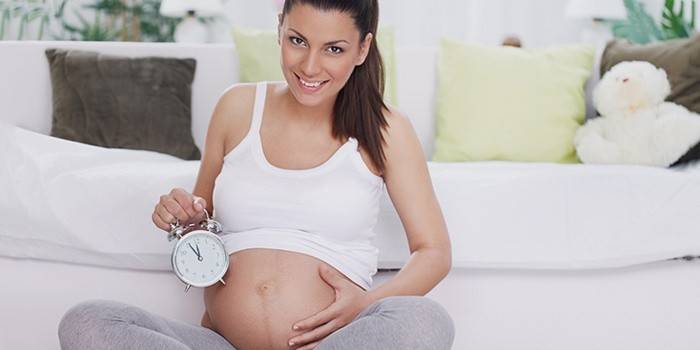
Why does my stomach hurt in the second and third trimester?
1. As pregnancy progresses and the baby grows, the uterus continues to stretch , which increases pain . Attacks can last up to a week. It increases even more as labor approaches , especially from 36 to 38 weeks, when the baby begins to descend into the pelvis. 2. As the end of pregnancy approaches, a pulling in the lower abdomen along with bloody discharge from the genital tract may indicate premature placental abruption . Through the placenta, the baby receives nutrients and breathes.
Detachment before birth means that it is fatal for the baby.
You should seek medical help immediately.
3. Pain in the lower abdomen can also be a consequence of frontal dysfunction syndrome .
What it is? The four pelvic bones are attached to each other by a joint called the symphysis. It is responsible for stabilizing the pelvis during walking and sitting. During pregnancy, the hormone relaxin is secreted , which softens the joints, thereby allowing the birth canal to dilate. When relaxin is released excessively, the joints soften and stretch too much, which causes pain in the lower abdomen. In severe cases, pain significantly complicates the course of pregnancy . is estimated to affect one in 35 pregnant women. There is pain in the area
- pelvis
- groin
- lower back
- inner thigh.
It becomes difficult for a woman
- stand on one leg
- walk up the stairs
- move while lying on your back
- get out of the car and get into it.
Symptoms are more pronounced in the second trimester, from 12 weeks. Some pregnant women will have less of a problem with the syndrome, and some will have severe difficulties
- sitting
- lying down
- during sleep
- movements.
In addition, in case of severe forms of the syndrome, it will not be possible to have sex.
There is no prevention in this case, and it is difficult to predict whether it will hurt in subsequent pregnancies, but at least you will know and can be better prepared. 4. Well, the main reason for nagging abdominal pain after 38 weeks. The birth has begun ! But before you grab your things and rush to the hospital, check whether your contractions are real or false.
Feel
The main sensations of this month are fatigue and harbingers of childbirth, now the woman clearly feels all the movements and movements of the fetus, the stomach has reached its maximum and it is extremely difficult to carry it. But a couple of weeks before giving birth, it becomes easier to breathe and eat due to the lowering of the abdomen and insertion of the head into the small pelvis. At the same time, pressure and discomfort in the pelvic area will increase - constipation may increase and the urge to urge more often due to pressure from the head on the bladder. There may be pain in the sacrum, pubis and thighs due to irritation of nerve endings.
There may be swelling and the risk of varicose veins, the skin on the abdomen becomes very tight and itchy, and stretch marks may occur. Fainting and dizziness are common due to hypoxia and compression of the vessels by the large uterus. Preparations for childbirth are taking place and weight loss of 1-2 kg, diarrhea and vomiting may occur as an option to cleanse the body before childbirth. A woman feels that her lower abdomen is pulling, and abdominal pain may occur, which indicates the onset of regular contractions and labor.
How to avoid stretch marks during pregnancy
To prevent the appearance of stretch marks, proper daily skin care is necessary. There are special creams and lotions created specifically for pregnant women. They do not contain harmful substances, are saturated with beauty vitamins: A, E, as well as other elements that moisturize the skin and restore its blood circulation. It is best to apply such creams to the areas that suffer most from sprains from the third month of pregnancy. Such procedures will not completely protect you from skin problems, but they will significantly reduce the risk of their occurrence.
In addition to creams and lotions, the following will help improve skin condition:
- massage;
- proper nutrition;
- wearing a bandage.
You can massage the abdomen yourself, lightly stroking it and pinching problem areas.
Massage brushes or gloves help improve blood circulation. This procedure stimulates blood flow and helps strengthen the skin. However, if there is a threat of pregnancy, massage is completely contraindicated. It can increase the tone of the uterus and lead to miscarriage.
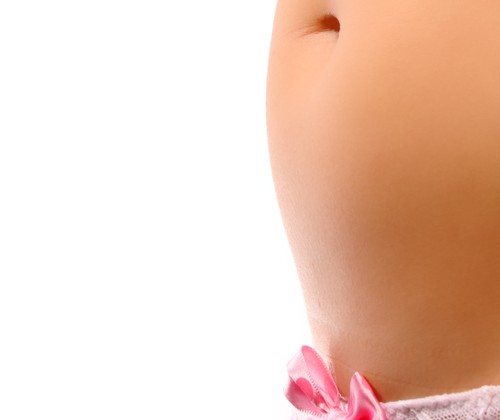
Wearing a bandage can also help maintain the integrity of the subcutaneous tissue. This is an excellent product that helps not only for cosmetic purposes. By wearing it starting from 5-6 months, you can significantly improve your health and recover much faster after childbirth. Wearing a bandage can help reduce skin pain that occurs during pregnancy.
The rate at which the abdomen increases during pregnancy varies from person to person and no one can control it. But careful skin care will help reduce the pain that occurs when it is stretched.
Video
Similar articles
Wisdom Tooth Cutting, Gums Hurt: How to Relieve the Pain
2601 Super User
Rash on the Abdomen of a Child Photo With Explanations
7727 Kokh V. A.
Discharge
Towards the end of pregnancy, the discharge intensifies, protecting the baby from infections that can enter through the vagina. Now it is important that infection does not develop, as this will be dangerous during childbirth. You should immediately consult a doctor if you have curdled, crumbly or copious milky discharge, and especially yellowish, green, gray, foamy and with an unpleasant odor. They need to be treated immediately. Such discharge reduces the elasticity of vaginal tissue and leads to complications during childbirth and an increased likelihood of postpartum inflammatory processes.
There is also a gradual removal of the mucus plug - these are transparent or slightly pink lumps of mucus; the plug can come away either gradually or simultaneously, as a lump of mucus. Childbirth will begin soon.
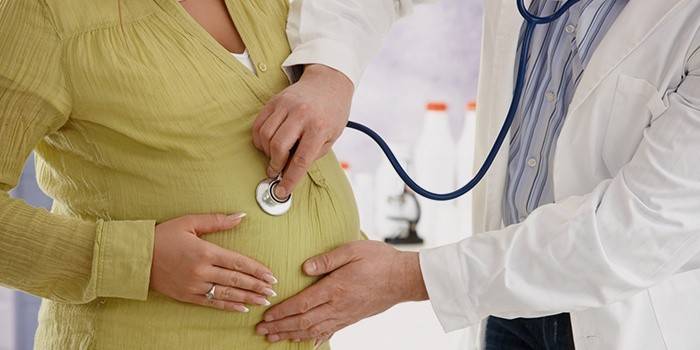
Approved drugs and traditional methods for pain in the lower abdomen
The first thing to do when pain occurs is to lie down and relax. If the discomfort is caused by sprained ligaments or an uncomfortable position of the fetus, then this should bring results.
A warm bath for 15–20 minutes relieves spasms of the uterus and peritoneum and calms the body. If it is not possible to take a shower or bath, then a warm diaper or heating pad can help - it is applied to the sore spot. But you can use this method only if you are completely sure that there is no inflammation.
Wearing a bandage can be considered more of a preventive measure - it relieves the load on the spine and supports the abdomen, preventing the ligaments from stretching too much.
Self-medication is definitely not worth it, as you can overlook a dangerous condition. If after resting and warming up the pain does not go away, then you need to visit a doctor.
In case of severe pain, you can take an antispasmodic drug approved during pregnancy. These can be tablets - No-shpa, Drotaverine, or suppositories - Papaverine. After this, you must immediately consult a doctor!
Analyzes and examinations
This month, visits to the doctor will become weekly; it is important to assess the woman’s general condition, her weight and the presence of edema, blood pressure and determine the level of leukocytes, protein and glucose in the urine before each visit. The doctor will assess the woman's readiness for childbirth and may schedule hospitalization in the maternity hospital in advance or at the onset of labor.
At the beginning of the month, an examination will be carried out on the chair and a smear will be taken for flora; additional blood tests may be prescribed. All planned ultrasounds have already been completed, but in case of doubts or concerns, the doctor may prescribe additional ultrasounds or Dopplerography, fetal CTG. This will help in choosing tactics during childbirth and deciding whether it will be natural or whether a cesarean section is indicated.
Physiological causes of abdominal discomfort in late pregnancy
Painful sensations in the lower abdomen in late pregnancy make a woman nervous. In fact, there is no reason to worry; pain usually occurs due to physiological changes, such as:
- motor activity of the child - the baby in the stomach moves his arms and legs chaotically, and the longer the period, the less space he has, so the mother’s internal organs suffer from his movements;
- growth of the uterus - in order to accommodate the fetus, the uterus significantly increases in size and moves neighboring organs;
- softening of ligaments - to prepare the pelvic girdle for childbirth, the body increases the production of the hormone relaxin, it softens the ligaments so that the distance between the pelvic bones increases, and the child can pass through the birth canal. This process is also accompanied by pain;
- training contractions - periodic contractions of the uterus prepare a woman’s body for childbirth, mobilize the body and facilitate the birth process itself.
Mom's diet and weight
During this period, the uterus puts maximum pressure on the internal organs and you need to eat right to avoid nausea and vomiting, constipation and other digestive problems. The birth process and the condition of the baby largely depend on the mother’s nutrition. In the last months of pregnancy, it is worth switching to hypoallergenic food with the exception of potentially dangerous allergens, giving up foods that can become a potential source of intestinal infections or poisoning - canned food, raw foods, unboiled milk, poorly fried meat and fish. It is important to pay special attention to products with calcium - dairy products and cottage cheese, yoghurts. Equally important is consuming enough protein in the form of red meat and iron-containing foods. The amount of meat and fish in the diet should be slightly reduced in favor of vegetables and fruits, vegetable oils, grains and light foods. It is worth giving up fatty, fried and spicy foods, excess sauces and spices, steaming, baking, stewing or boiling food. It is worth eating often, but in small portions, avoiding carbonated drinks, fermented foods, excess sweets and carbohydrates. You can do fasting days once a week in consultation with your doctor. Before giving birth, your appetite may disappear altogether - and this is normal, the body is preparing for difficult work and cleanses the intestines.
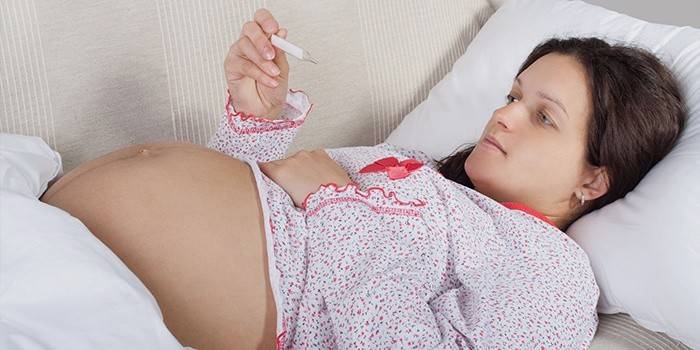
Belly at 12 weeks of pregnancy: tugs, hurts
Abdominal pain varies in nature. The most common complaints of pain are those related to abdominal pain. If such unpleasant pain sensations arise from time to time and are localized in the area of the sides of the abdomen and radiate to the back and lower back, then they do not pose any danger to the body. This is usually due to the effect of progesterone on the ligaments that serve to support the uterus. If pulling and aching pain sensations occur in the lower abdomen, then they may well cause anxiety. There is no way to endure such pain. If they worsen and are accompanied by spotting blood from the vagina, then this is a sign to immediately call an ambulance. Otherwise, there is a risk of spontaneous abortion.
To prevent such disastrous consequences, the expectant mother is advised to take care of herself, lead a healthy lifestyle, eat right and trust her feelings. If any disturbances, dysfunctions or symptoms of miscarriage appear, you need to urgently, without delay for a second, seek help from an ambulance. Only with the help of medicine can the child be saved.
